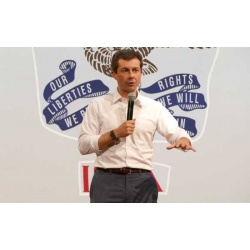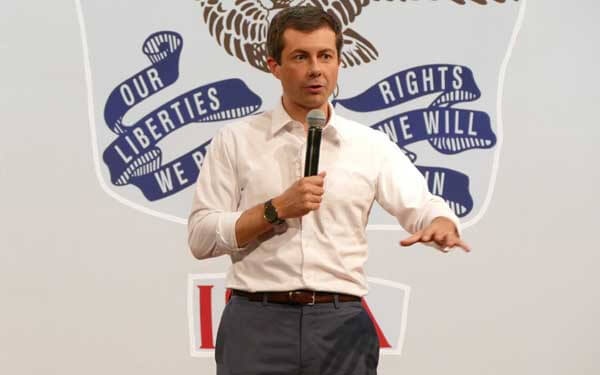
Mayor Pete introduced himself to over 400 people in Elkader Opera House Monday
(by decorahnews.com's Ben Gardner):
Who is Pete Buttigieg? Mayor Pete—the 37 year-old mayor of South Bend, Indiana—introduced himself to over 400 potential Iowa caucus-goers Monday afternoon at the Elkader Opera House. The campaign stop is part of a town hall tour the mayor is making of Iowa, including stops in Dubuque, Clinton, and Davenport. The campaign tour echoes the late Senator John McCain's "Straight Talk Express"—credentialed members of the media are traveling with Mayor Pete 24/7.
Buttigieg is the youngest candidate in the field of Democrats campaigning for the Presidential nomination. For many millennials and moderate Democrats, he's looking like an electable alternative to national front-runner former Vice President Joseph Biden.
A graduate of Harvard and a Rhodes Scholar, Buttigieg has also served as a Navy reserve intelligence officer and a financial consultant. He is also openly gay, and is the first openly gay candidate to run a major presidential campaign.
A recent Iowa poll from "The Des Moines Register" has Buttigieg in fourth place with 9%, a five point slip since June. According to the same poll, Sanders is 3rd with 11%, followed by Biden in 2nd with 20%, and Senator Elizabeth Warren overtaking Biden as the state-favorite with 24%.
The poll is significant because, within Iowa, it indicates 1) a surge of support for Warren within late summer, 2) a gradual decrease in Sanders support (25% in March, 16% in June, and 11% in September), 3) a lack of enthusiasm for Biden, and 4) significantly high favorables and enthusiasm for Warren and Buttigieg.
Buttigieg has slipped in Iowa polls since the spring. He's currently in fourth with 9%, a five point slip since June.
During his town hall meeting in Elkader, Buttigieg laid out his political priorities for his potential caucus-goers. He spoke on health care, issues of national security and foreign policy, rural development, gun control, President Trump, the tenuous state of democratic institutions, and his electability in a general election.
Echoing the demeanor of former President Barack Obama, Buttigieg spoke in long sentences and in a measured cadence. There are many similarities between the personas of Buttigieg and Obama: both are highly educated and both have attracted a core of young, passionate supporters. However, the name of former President Obama was conspicuously absent from Mayor Buttigieg's presentation. Buttigieg isn't alone amongst Democrats in being uncertain how to approach the legacy of Obama. Clarifying the pros and cons of Obama's legacy will prove essential in determining how Democrats approach the general election and define their party identity.
The crowded field of Democrats indicates an identity crisis within the base of the Democratic Party. For many Democrats, the progressive advancements ushered in by Clinton in the '90s and continued under Obama (notably Obamacare), experienced significant setbacks with the election of President Trump. The broad field of Democrats represents the diverse opinions within the base as to how to approach Trump in the general election and a coherent party policy of governance post-Trump.
Buttigieg—with his young charm, intelligence, and emphasis on moderate progressive reform—is one pathway for Democrats. From discussions with attendees of the Buttigieg town hall, it's clear he's impressed many potential Iowa caucus-goers. Nevertheless, he has failed to get double-digits in national polls. Some of this is Buttigieg still remaining unknown for many potential voters. With the winnowing field, it will be interesting to observe how he polls once he's better known.
However, it's also clear that most potential caucus-goers are still undecided. But, with the caucus four months away, the boundaries of the field will continue to constrict. Allegiances will shift, politicians will continue to harangue us with their presence, and we—in northeast Iowa—will continue to have a prime spot to observe and take part in the process.
Site designed and maintained by Iroc Web Design Services©.
Your Small Business Web Design Solutions.™


